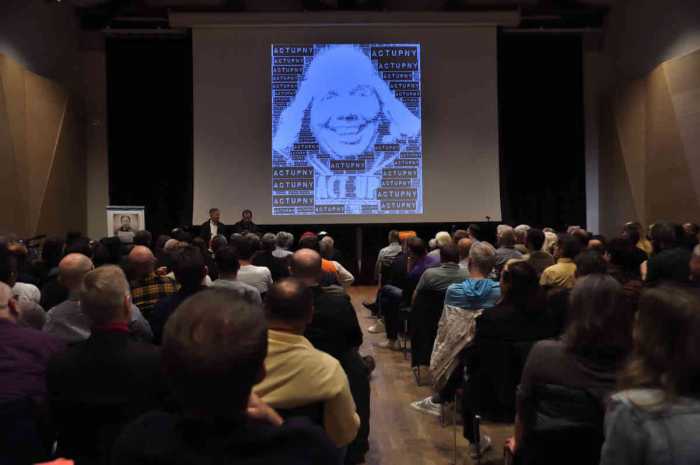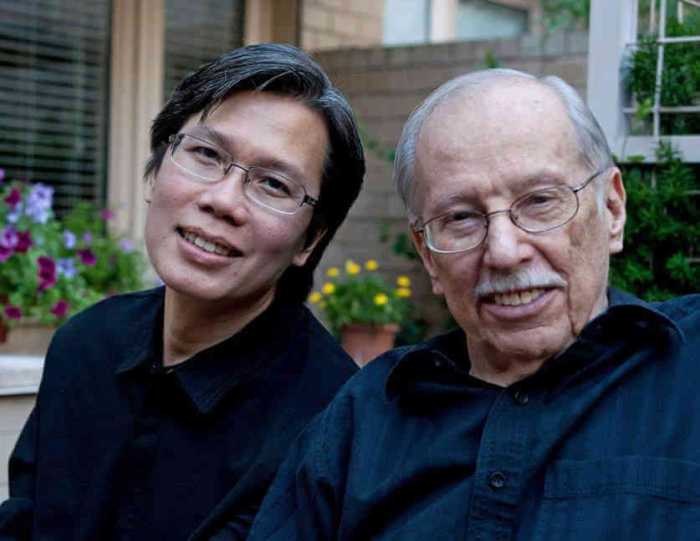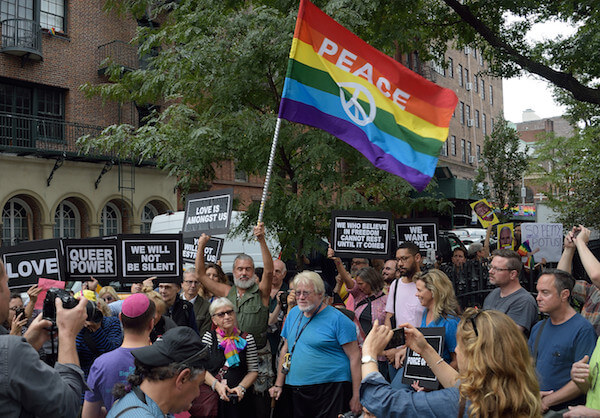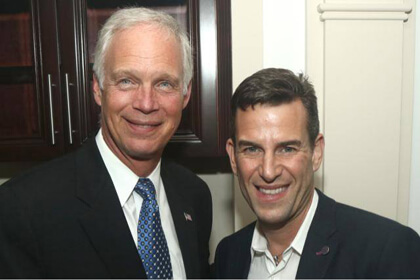Stand-up comic and author Bob Smith, seen here performing at a fundraiser for the Stonewall Democratic Club of New York City in 2010, died at age 59 on January 20 after living with ALS for nearly a dozen years. | JON NALLEY
“Even though Mr. Smith don’t say nothing, you see in his eyes he’s a kind man,” said the nurse, after changing Bob’s diaper.
Anyone who spent 60 seconds with Bob Smith sensed his gentle disposition. Like many fans, I originally took note of the comic during his HBO comedy special in 1994, the first for an out queer comedian, and again three years later on the cover of his Lambda-award winning collection of essays, “Openly Bob.” For the book’s photo, he’s seated in a relaxed pose you’d spy among good friends chatting in the park on a spring day: legs crossed, arms cradling knees, hair casually tossed, his face sporting an “ah-shucks” grin. He was America’s sweet, handsome, gay-next-door.
Remembering the pioneering gay comic and writer Bob Smith
Twenty-one years later, I was no longer just a fan, but part of the author’s family of choice, thanks to marrying Eddie Sarfaty, Bob’s writing partner and comedy brother. We were together at home on a Friday evening, when my husband’s phone rang. It was Venga, the nurse on the overnight shift. “Bob’s vitals have dropped. I’ve boosted his oxygen level, but it’s not sustainable.”
Eddie phoned Bob’s partner, Michael Zam, at his place in the Village, where he was recovering from a nasty case of laryngitis and keeping his distance due to Bob’s compromised immune system.
“Stay home,” Eddie told Michael. “We’ll check on Bob and call you.”
A publicity shot of Bob as a young comic and author.
Eddie and I threw on our winter coats and hailed a taxi to Bob’s apartment at the Actor’s Fund Building on West 57th Street.
Bob’s eyes were shut, his skin ashen and cool to the touch, almost reptilian. It was clear he was near the end.
We spent a few hours with Bob. I read him encouraging Facebook posts from friends who’d contributed in his honor to ALS TDI, a nonprofit biotech company working to end the horrible neurological disease.
When I was finished, Eddie opened an envelope from my mother, who had been writing Bob weekly. She’d painted him a watercolor of snow in the Rockies, accompanied by a Mary Oliver poem. Years earlier, Bob had sent my mom two of the artist’s books. Eddie read the selection aloud.
“The Old Poets of China”
Wherever I am, the world comes after me.
It offers me its busyness. It does not believe
that I do not want it. Now I understand
why the old poets of China went so far and high
into the mountains, then crept into the pale mist.
“Tonight?” we said, asking Venga for his opinion.
“Off the record? No, but surely over the weekend.”
During the previous week, I’d sent an email to those New Yorkers closest to Bob, inviting them to a Sunday afternoon open house, a chance to pay visits and surround him with love. Maybe we should move the date up to Saturday, my husband and I agreed.
Eddie kissed Bob’s forehead. I squeezed his icy hand. We walked out the door.
***
When I started dating Eddie in 2009, Bob, no longer the carefree young man from his book, was in his third year of ‎ALS, also known as “Lou Gehrig’s disease,” a condition that typically kills people in three to five years.
Bob was Eddie’s roommate in Hell’s Kitchen when he was first diagnosed and soon needed assistance with buttons and shoelaces. Michael and Bob had only been boyfriends for a year, and though Michael knew Bob’s condition would worsen, he asked Bob to move in with him.
Bob was the first out gay stand-up comic to have his own HBO special and to appear on “The Tonight Show.”
As Bob’s hands, taut from nerve deterioration, became little more effective than ping-pong paddles, Michael needed help. Eddie pitched in. Bob switched to wearing slip-ons, track pants, and T-shirts. Many mornings, Michael would help his partner dress, but when Bob started sleeping later into the morning, Eddie would travel to the West Village and ready him for the day.
It was a struggle for Bob to remain independent, but he was stubborn and determined. He insisted on riding the subways alone. When his hands became unable to clutch the rider’s card, he had one attached to a green plastic bracelet dangling from his wrist. For a while, Bob maneuvered the swipe like a penguin clutching a piece of paper. He was so good-natured, he just assumed people would help him. Few could understand what Bob tried to say, other than Michael, Eddie, and, to a lesser extent, me.
When Michael had to teach at NYU or travel to Los Angeles for his work as a screenwriter, Bob would spend those times with Eddie and me and our two cats, Julia and Dash, rather than be alone.
His speech garbled, Bob was still smiling and laughing.
“Should I write a prescription for antidepressants?” his doctors regularly asked. Bob always declined, determined — despite his challenges — to see good in life. He joked that his friends needed psychotropic drugs to make it through the day, but Bob, stricken as if he’d angered the gods, did not.
In 2011, Bob, having lived with ALS for five years, was still writing, getting published, and getting press photos taken. | DRAPER SHREEVE
Bob was able to chomp on chunky foods, like burritos and hamburgers, could still drag himself up the staircase at his apartment or our walk-up, and liked to sit for hours at the table, using an iPad for writing. He’d flip his wrist over, his useless right hand held perpendicular in the fey manner homosexuals were once stereotyped as doing. Then, lowering his forearm, he adjusted the right shoulder to lift and lower the middle finger, laboriously plucking out letters.
Facebook became his main method of staying in touch with friends and fans. He had written three books since the malady’s onslaught: the gay sci-fi novel “Remembrances of Things I Forgot,” a collection of essays called “Treehab,” and “The Third Actor,” a yet-to-be-released work of fiction set in ancient Greece that chronicles the bisexual, neurotic life of Sophocles. I believe upon publication that novel will be his greatest commercial success.
In October 2014, Bob developed a nasty cough that turned into pneumonia. The doctors performed a tracheotomy and he was confined to a bed in Mount Sinai West’s intensive care unit. We doubted he’d ever climb stairs, chew, get out of bed, or write again.
Recovery was slow, but Bob fought and made progress, and was moved to a nursing home. There, though he trudged up and down the depressing hallways to strengthen his legs, he was no longer able to climb the three flights to the apartment he shared with Michael, nor the two flights where Eddie and I lived. Tom Viola, executive director at Broadway Cares/ Equity Fights AIDS, came to the rescue by introducing us to the management at the Actor’s Fund Building, also known as the Dorothy Ross Friedman Residence.
In his new apartment, Bob lived with two round-the-clock home health aides.
“I didn’t like gay people until I met Bob,” said Pierre, a strict Catholic from Haiti. He and Idris, a young Muslim man from Ghana, were moved by Bob’s kindness and sense of humor. They bonded over the silliness of TruTV’s “The Carbonaro Effect,” and embraced Bob, not just as a patient, but as a friend. Bob’s condition had improved enough that he resumed writing.
“Bob stopped breathing!” Idris screamed in a call to Eddie the next March. “Tell him to call 9-1-1,” I shouted from our kitchen. We jumped into a taxi and arrived right after the EMT crew. Bob was on the floor, his face blue. We were sure he’d die.
Bob survived, but spent the next 21 months in Harlem’s Henry J. Carter Specialty Hospital and Nursing Facility before receiving the greenlight to go home in December. Five days later, another 9-1-1 call, another stint in the ICU. Bob spent yet another of his Christmas Eve birthdays in the hospital. Again, we expected he’d die, but 10 days later, shortly into 2018, Bob was given permission to leave.
But he’d changed. I searched, but couldn’t find the sweetness in his brown eyes. Bob seemed weary, withdrawn — maybe even angry. During a visit before the Golden Globes, I used FaceTime to reach Michael, who was nominated for a writing award. “I’m racing into the Beverly Hilton, but I love you, honey.” Bob struggled to remain awake during the short call.
***
“Hello?” Eddie asked groggily, not yet awake at 6:50 am on Saturday morning, January 20.
“I’m sorry. Mr. Smith expired a few minutes ago.”
Bob — pioneering comic, acclaimed writer, beloved son, brother, father to Madeline and Xander, lover, and friend — had now climbed to the highlands and “crept into the pale mist.”
A memorial for Bob Smith, with performances and remembrances, will be held on Monday, March 5 from 4:30-6:30 p.m. at Carolines, 1626 Broadway, between 49th and 50th Streets. Admission is free.






































